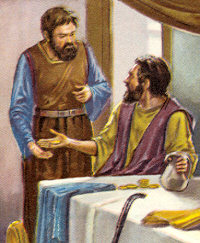
Daily Readings for: September 22, 2013
(Readings on USCCB website)
Collect: O God, who founded all the commands of your sacred Law upon love of you and of our neighbor, grant that, by keeping your precepts, we may merit to attain eternal life. Through our Lord Jesus Christ, your Son, who lives and reigns with you in the unity of the Holy Spirit, one God, for ever and ever.
RECIPES
ACTIVITIES
o On how our Work is Love, and how we can work with Christ to save Souls with our Love
PRAYERS
o Parents' Prayer for Children
o Children's Prayer for Parents
LIBRARY
o Becoming Like Little Children | Caryll Houselander
o Children Are Supreme Gift of Married Life | Pope John Paul II
o Marriage - Family - Children | Pope Paul VI
o You Revealed These Things to Children | Pope John Paul II
Ordinary Time: September 22nd
Twenty-Fifth Sunday in Ordinary Time
Old Calendar: Eighteenth Sunday after Pentecost
"For the children of this world are more prudent in dealing with their own generation than are the children of light. I tell you make friends for yourselves with dishonest wealth, so that when it fails, you will be welcomed into eternal dwellings."
Click here for commentary on the readings in the Extraordinary Form of the Roman Rite.
Sunday Readings
The first reading is taken from the Prophet Amos 8:4-7. Amos was a shepherd in the kingdom of Judah who was called by God to go to Israel, the northern kingdom. There he was to speak in God's name to the people. This was in the 8th century B.C. The country enjoyed material prosperity but idolatry and injustice were rife among the upper classes especially. Against these vices the prophet spoke fearlessly, until he was driven from the kingdom eventually. Today's reading deals with the injustices practiced against the poor and the helpless.
The second reading is from St. Paul's first letter to Timothy 2:1-8. What St. Paul is telling Timothy, the bishop of Ephesus, to teach his congregation is the necessity and the obligation of prayer.
The Gospel is from St. Luke 16:1-13. These words of Christ warning those who would follow him on the road to heaven not to become the slaves of earthly things are applicable to all of us. Most of us may feel that this warning is for millionaires and business magnates. Our Lord didn't say so. There was not a single millionaire in his audience. He meant it for all of us, for what he warned against was not the just acquisition of this world's goods but their unjust acquisition, and the dishonest use of them when they were justly acquired.
It was God who created all that exists in this world. He intended these goods for the use of man. We are only managers, therefore, of these worldly goods. It is on our way of managing these goods, not on the quantity we had to manage, that our judgment will be based. Millionaires can get to heaven while all paupers have no guarantee that they will make it. Our Lord deduces two lessons for us from the parable of the unjust manager or steward. Firstly, the enterprise which he showed in providing for his earthly happiness when he would lose his employment, was greater and keener than that shown by most of us in providing for our eternal happiness.
Did I give one hour a day to God and the things of God, helping the needy, learning more about my religion, giving a hand in parochial affairs, advising those in difficulties, spiritual or temporal, praying for my own and my neighbor's needs—yet even if I did, it is less than one-tenth of the free time I had at my own disposal.
If I did not, if I barely managed to to get in the Sunday Mass and a few hasty prayers, could anyone suggest that I was showing great interest and was very enterprising as far as my future life was concerned? God is very generous with me. He gives me lots of time for providing for my health and temporal needs each week, and a lot of free time besides. I should not express surprise if he is disappointed at how little of that wonderful gift of time I am willing to give back to him. The unjust steward was far more enterprising as regards earthly provision for himself.
The second lesson our Lord wishes to teach us is that we should use what we can spare of our earthly possessions in helping those who are in need of our help. By doing that, we will be making friends who will help us at the judgment seat to get a lasting reception in heaven. Remember that description of the judgment which our Lord gave when he said, "I was hungry and you gave me to eat, I was naked and you clothed me"? What we do for the needy, we do for Him. Those whom we help, as far as we can, will be witnesses testifying for us when our final examination, on which our eternity will depend, comes upon us.
Two resolutions worthy of your serious consideration today in relation to earthly goods are: Never let them take up all your time. You have a far more serious purpose in life. Give it a little more thought and enterprise than you have been doing. Secondly, be grateful to God for what He has given you in this life. You might like to have a lot more, but God knows best. Work honestly and be generous with what you have. You are serving God, not money. God will be waiting for you where there is no currency, and where the one bank account that matters will be the good use that you made of your time and your share of this world's goods while you were alive.
— Excerpted from The Sunday Readings Cycle C, Fr. Kevin O' Sullivan, O.F.M.